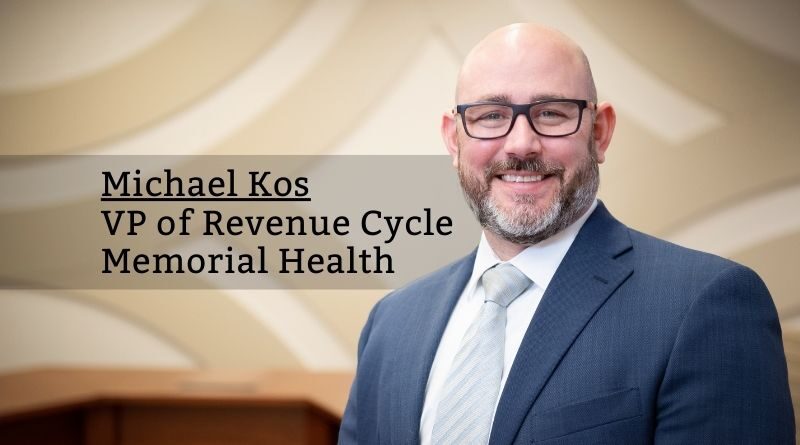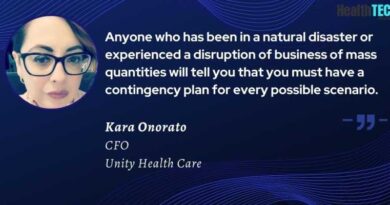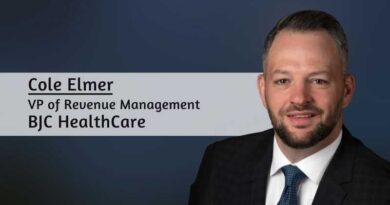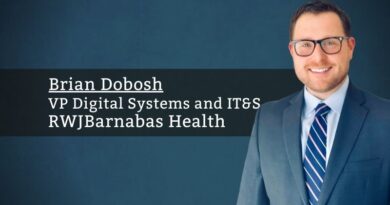Systemization of RCM processes resulting from strategic inflection points
By Michael Kos, VP of Revenue Cycle, Memorial Health
One of the leading healthcare organizations in IL, Memorial Health based in Springfield is a five-hospital, community-based, not-for-profit organization that provides a full range of inpatient, outpatient, home health, hospice, behavioral health, primary and specialty care physician services in Sangamon and the neighboring counties. We deliver high-quality, patient-centered care in support of our mission to improve lives and build stronger communities through better health.
Like many other health systems across the country, Memorial Health is currently engaged in evaluating the “systemization” of clinical and financial systems. The value proposition of systemization was acutely present both at the start of the pandemic phase of COVID-19 – and even today as Memorial Health navigates the endemic stage of the pandemic itself. The ability to systemize clinical and financial systems presents the opportunity to streamline not only the patient experience across the continuum of care – but also improve the physician and colleague experience. In addition, the ability to manage our clinical and financial systems is critical given the current external pressures health systems are facing across the country.
The difference about Memorial Health is that our leaders and colleagues within our revenue cycle systems have the humility and willingness to not only “lean in” but to utilize technology to improve processes.
To give a sense of how immense this project is, Memorial is currently working to collapse four electronic health record (EHR) and patient billing systems underneath our Cerner enterprise strategy. Couple that with changes in how colleagues functionally interact with the electronic health record (EHR) and billing systems, one can see how big of a lift this priority is from a systemization perspective. This systemization strategy for Memorial Health is embodied in our “One Memorial” strategic priority, whereby all facility hospitals will reside on Cerner Millenium and ambulatory providers on Allscripts Touchworks. In terms of Memorial’s strategy for revenue cycle management (RCM), Cerner Patient Accounting was selected in 2015 as the source of financial record for both acute and ambulatory providers.
Memorial’s migration throughout our “One Memorial” strategy kicked off in 2019 with our transition to Cerner Patient Accounting. This transition, replacing two older, end-of-life systems, was immensely successful. With RCM system transitions, keeping steady cash flow post implementation along with recognition of system efficiencies is an absolute must. Memorial’s positive experience is attributable to each and every colleague within all of our revenue cycle departments. From Patient Access navigating a new registration system, utilization review nurses challenging level of care disputes within the electronic record and billing colleagues working with patients and insurance providers on account clearing, all members of our finance team “leaned in” throughout this implementation.
Our experience with our Cerner Patient Accounting journey is summarized by these key takeaways:
- Net Days in AR decreased by 16%
- Year-over-year increase of cash collection of 7% or more
Our success in RCM can be attributable to all members of our team working toward fulfilling our mission to “improve lives and build stronger communities through better health”. Each colleague understands the immense responsibility of being a representative of Memorial, and advocates for patients facing their darkest hours. There are many analogies that are used to describe RCM. From comparing revenue processes to a factory production line or an orchestra playing Beethoven’s 5th symphony piece, the similarity in all of these analogies is the need for every colleague and department to work together flawlessly to navigate an extremely complex system in order to work efficiently.
The difference about Memorial Health is that our leaders and colleagues within our revenue cycle systems have the humility and willingness to not only “lean in” but to utilize technology to improve processes. We do this to not only better our processes, deliver a better patient experience, or generate more return through collections, but because it is the right thing to do for our communities.
While we here at Memorial feel we have strong leaders, team and culture, there are several complexities we are contending with in our markets. The predominant stressor we face is the increase in the time and resources it takes to manage all aspects of the revenue cycle process. From disputing level-of-care payor denials on the pre-bill side to challenging payor policies and procedures, the cost to collect has exponentially increased over the last few years. The role of both technology and relationships is the strategy we have deployed to combat these stressors.
At Memorial Health, relationships matter. Whether it’s the relationship with our patients, providers, colleagues or payors, our respect for developing these relationships over time is an important tool in our toolbox to combat increasing revenue cycle complexities. At all spectrums within our revenue cycle teams, the value of these longstanding relationships allows to work through revenue cycle barriers through thoughtful, concentrated and transparent dialogue.
On the technology side, Memorial Health is always looking for opportunities to utilize technology to improve our RCM capabilities. This includes reviewing the latest trends within the industry, third-party vendor product offerings or improvements within our Cerner enterprise infrastructure. Especially poignant in RCM is the role of automation, API’s or AI-based functions that can help alleviate repetitive tasks experienced by our revenue cycle colleagues. While this is a newly forming capability within RCM, we understand that technology is evolving and will likely be a key part of our strategic vision as we continue our “One Memorial” systemization strategy.
In closing, we here at Memorial are committed to our “One Memorial” systemization journey. This is an exciting time for all of us in RCM to continue to improve our capabilities in order to improve the health of the people and communities we serve.



